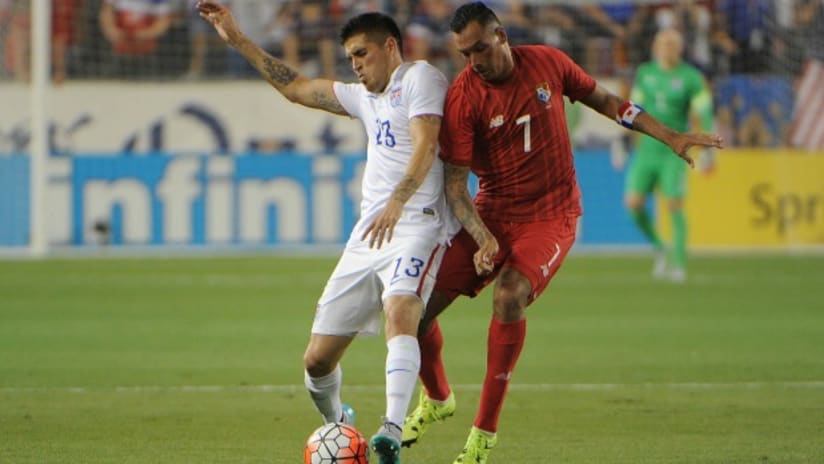KANSAS CITY, Kan. – More than a decade ago, in a different coaching life, Jurgen Klinsmann threw a young, unproven centerback with great potential to the wolves.
It was September 2004 and Germany was in Tehran to take on Iran in front of 120,000 fans at the Azadi Stadium. Per Mertesacker was a 19-year-old uncapped substitute with one choice: sink or swim.
Of course, Mertesacker swam – though not without the occasional hiccup – and eventually collected more than 100 caps and a World Cup winner’s medal with Germany, all the while reinforcing his coach’s view of player development.
In the wake of yet another table-topping Gold Cup group campaign for the United States – they’re now 13 of 14 in CONCACAF’s marquee competition – those lessons came to the forefront once again on Monday during a 1-1 draw against Panama.
This time it’s John Anthony Brooks and Ventura Alvarado learning on the job as Klinsmann balances growing pains and potential against pragmatism and the need for results, a theme that played itself out over two halves in a match that saw the German’s preferred centerback pairing initially falter before righting the ship.
“The only way for younger players to mature, get better and get stronger is to grow into these games and have these experiences. Both Ventura and also John, they grew with every minute,” Klinsmann said, drawing on Mertesacker’s experience to make his point. “There were some situations that were a bit shaky in the first half. In the second half, they cleaned it up. They were absolutely on top of things.”
Shaky could be construed as an understatement.
Brooks, who entered the match a caution away from missing the quarterfinals for yellow-card accumulation, waited just 16 minutes to put in the challenge that drew referee Roberto Garcia’s ire and keep him on the bench on Saturday in Baltimore.
Alvarado, meanwhile, found himself turned inside out on Panama’s game-opening goal, a neat give-and-go between Blas Perez and Luis Tejada that ended with the FC Dallas forward tapping the latter’s cross past Brad Guzan, a moment that stuck with the 22-year-old well after the final whistle blew.
“Mentally, the first half, I felt real bad. I was real bad, and I just mentally got mad with [myself],” Alvardo told reporters after the match. “I was like, 'I'm going to give it all. I don't have [anything] to lose,' and I felt a little better. It wasn't a great game for me, but I kept my head up.”
That, one has to believe, is music to Klinsmann’s ears.
In a match that had no bearing on the US’ standing in the group or quarterfinal seeding, it wasn’t failure that would have concerned the German, more so the inability to recognize and grow from it.
“It was, here and there, very difficult for them,” Klinsmann said. “… The longer the game went on, the more personality developed and the stronger they became. This is exactly the growing path that we want to see from these two young centerbacks.”
“The inner group atmosphere is about competition,” he added. “We want to see them grow, and we want to see them take things in their own hands. That’s actually what’s happening right now. They get the message that they’re not safe. We have others that can come in.”
The US will have no choice but to make a change in the quarterfinals, with Tim Ream or Omar Gonzalez the likely replacement for Brooks should Klinsmann opt to stick with the options currently at his disposal.
Of course, he could choose to shuffle the deck, with the option to swap players from the current roster with those on the 30-man provisional roster, a strategic play Klinsmann used to great effect in 2013. That might mean Matt Besler, or it might mean no one at all, with those decisions expected to be public sometime Tuesday.
Either way, it seems clear Klinsmann’s willing to weather some shaky moments to draw out the ability that he believes Brooks and Alvarado possess. Whether that’ll remain the same as group turns to the knockout stage and mistakes equal elimination remains to be seen.
“This is a process, and a tournament never finishes with the same group that starts the tournament,” Klinsmann said. “I haven’t seen a tournament like that yet.”













